Wikipedia community
 | |
| Type | Informal organization of individual contributors |
|---|---|
| Focus | Free, open-content, wiki-based Internet encyclopedias |
Area served | Worldwide |
| Services | Authoring and editing Wikipedia |
| Website | wikipedia |
The Wikipedia community, collectively and individually known as Wikipedians, is an online community of volunteers who create and maintain Wikipedia, an online encyclopedia. Since August 2012, the word "Wikipedian" has been an Oxford Dictionary entry.[1] Wikipedians may or may not consider themselves part of the Wikimedia movement, a global network of volunteer contributors to Wikipedia and other related projects hosted by the Wikimedia Foundation.
Demographics
In April 2008, writer and lecturer Clay Shirky and computer scientist Martin Wattenberg estimated the total time spent creating Wikipedia at roughly 100 million hours.[2] As of August 2023, there are approximately 109 million registered user accounts across all language editions, of which around 280,000 are "active" (i.e., made at least one edit in the last thirty days).[3]
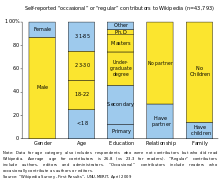
A study published in 2010 found that the contributor base to Wikipedia "was barely 13% women; the average age of a contributor was in the mid-20s".[4] A 2011 study by researchers from the University of Minnesota found that females comprised 16.1% of the 38,497 editors who started editing Wikipedia during 2009.[5] In a January 2011 New York Times article, Noam Cohen observed that 13% of Wikipedia's contributors are female according to a 2008 Wikimedia Foundation survey.[6] Sue Gardner, a former executive director of the Wikimedia Foundation, hoped to see female contributions increase to 25% by 2015.[6] Linda Basch, president of the National Council for Research on Women, noted the contrast in these Wikipedia editor statistics with the percentage of women currently completing bachelor's degrees, master's degrees and PhD programs in the United States (all at rates of 50% or greater).[7]
In response, various universities have hosted edit-a-thons to encourage more women to participate in the Wikipedia community. In fall 2013, 15 colleges and universities—including Yale, Brown, and Penn State—offered college credit for students to "write feminist thinking" about technology into Wikipedia.[8] A 2008 self-selected survey of the diversity of contributors by highest educational degree indicated that 62% of responding Wikipedia editors had attained either a high school or undergraduate college education.[9]
In August 2014, Wikipedia co-founder Jimmy Wales said in a BBC interview that the Wikimedia Foundation was "... really doubling down our efforts ..." to reach 25% of female editors (originally targeted by 2015), since the Foundation had "totally failed" so far. Wales said "a lot of things need to happen ... a lot of outreach, a lot of software changes".[10] Andrew Lih, writing in The New York Times, was quoted by Bloomberg News in December 2016 as supporting Wales's comments concerning shortfalls in Wikipedia's outreach to female editors. Lih states his concern with the question indicating that: "How can you get people to participate in an [editing] environment that feels unsafe, where identifying yourself as a woman, as a feminist, could open you up to ugly, intimidating behavior".[11]
In October 2023, a representative survey of 1,000 adults in the U.S. by YouGov found that 7% had ever edited Wikipedia, 20% had considered doing so but had not, 55% had neither considered editing Wikipedia nor done it, and 17% had never visited Wikipedia.[12]
Motivation
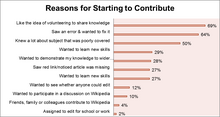

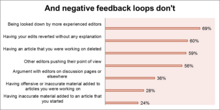
In a 2003 study of Wikipedia as a community, economics Ph.D. student Andrea Ciffolilli argued that the low transaction costs of participating in wiki software create a catalyst for collaborative development, and that a "creative construction" approach encourages participation.[13] A paper written by Andrea Forte and Amy Bruckman in 2005, called "Why Do People Write for Wikipedia? Incentives to Contribute to Open-Content Publishing", discussed the possible motivations of Wikipedia contributors. It applied Latour and Woolgar's concept of the cycle of credit to Wikipedia contributors, suggesting that the reason that people write for Wikipedia is to gain recognition within the community.[14]
Oded Nov, in his 2007 paper "What Motivates Wikipedians", related the motivations of volunteers in general to the motivations of people who contribute to Wikipedia.[15] Nov carried out a survey using the six motivations of volunteers, identified in an earlier paper.[16] The survey found that the most commonly indicated motives were "fun", "ideology", and "values", whereas the least frequently indicated motives were "career", "social", and "protective".[15] The six motivations he used were:
- Values – expressing values to do with altruism and helping others
- Social – engaging with friends, taking part in activities viewed favourably by others
- Understanding – expanding knowledge through activities
- Career – gaining work experience and skills
- Protective – e.g., reducing guilt over personal privilege
- Enhancement – demonstrating knowledge to others
To these six motivations he also added:
- Ideology – expressing support for what is perceived to be the underlying ideology of the activity (e.g., the belief that knowledge should be free)
- Fun – enjoying the activity
The Wikimedia Foundation has carried out some surveys of Wikipedia contributors and users. In 2008, the Wikimedia Foundation, alongside the Collaborative Creativity Group at UNU-Merit, launched a survey of readers and editors of Wikipedia.[17] The results of the survey were published two years later on 24 March 2010.[18] The Wikimedia Foundation began a process in 2011 of semi-annual surveys in order to understand Wikipedia editors more and better cater to their needs.[19][20]
"Motivations of Wikipedia Content Contributors", a paper by Heng-Li Yang and Cheng-Yu Lai, hypothesised that, because contributing to Wikipedia is voluntary, an individual's enjoyment of participating would be the highest motivator.[21] This paper suggests that although people might initially start editing Wikipedia out of enjoyment, the most likely motivation for continuing to participate is self-concept-based motivations such as "I like to share knowledge which gives me a sense of personal achievement."[21]
A study in 2014 by Cheng-Yu Lai and Heng-Li Yang explored the reasons why people continue editing Wikipedia content. The study used authors of the English-language version of the site and received 288 valid online survey responses. Their results indicated and confirmed that subjective task value, commitment, and procedural justice affected satisfaction of Wikipedians; and satisfaction influenced an author's continued intention to edit Wikipedia content.[22]
Editors of Wikipedia have given personal testimonials of why they contribute to Wikipedia. A theme of these testimonials is the enjoyment that editors may get from contributing to Wikipedia and being part of the Wikipedia community. Also mentioned is the potential addictive quality of editing Wikipedia. Gina Trapani of Lifehacker said "it turns out editing an article isn't scary at all. It's easy, surprisingly satisfying and can become obsessively addictive."[23] Jimmy Wales has also commented on the addictive quality of Wikipedia, saying "The main thing about Wikipedia ... is that it's fun and addictive".[24] Wikipedians sometimes award one another "barnstars" for good work. These personalized tokens of appreciation reveal a range of valued work extending beyond "simple editing" to include social support, administrative actions, and types of articulation work. The barnstar phenomenon has been analyzed by researchers seeking to determine what implications it might have for other communities engaged in some collaborations.[25] Since 2012, the Wikipedia page curation interface has included a tab offering editors a "Wikilove" option for giving barnstars and other such awards to other editors "as a reward for carefully curated work".[26] Wikilove has been described as "an immaterial P2P reward mechanism" that substitutes for a formal reputation-valuing system on the site.[27]
Media
Wikipedia has spawned a number of community news publications. An online newsletter, The Signpost, has been published since 10 January 2005.[28] Professional cartoonist Greg Williams created a webcomic called WikiWorld which ran in The Signpost from 2006 to 2008.[29] A podcast called Wikipedia Weekly was active from 2006 to 2009,[30][31] while a series of conference calls titled "Not the Wikipedia Weekly" ran from 2008 to 2009.[31]
Socializing
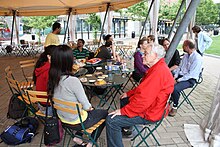
Offline activities are organized by the Wikimedia Foundation or the community of Wikipedia:
Wikimania
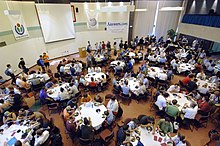
Wikimania is an annual international conference for users of the wiki projects operated by the Wikimedia Foundation (such as Wikipedia and other sister projects). Topics of presentations and discussions include Wikimedia Foundation projects, other wikis, open-source software, free knowledge and free content, and the different social and technical aspects which relate to these topics. Since 2011, the winner of the Wikimedian of the Year award (known as the "Wikipedian of the Year" until 2017) has been announced at Wikimania.
The first Wikimania was held in Frankfurt, in 2005. Wikimania is organized by a committee supported usually by the local national chapter, with support from local institutions (such as a library or university) and usually from the Wikimedia Foundation. Wikimania has been held in cities such as Buenos Aires,[32] Cambridge,[33] Haifa,[34] Hong Kong,[35] Taipei, London,[36] Mexico City,[37] Esino Lario, Italy,[38] Montreal, Cape Town, and Stockholm. The 2020 conference scheduled to take place in Bangkok was canceled due to the COVID-19 pandemic, along with those of 2021 and 2022, which were held online as a series of virtual, interactive presentations. The in-person conference returned in 2023 when it was held in Singapore, at which UNESCO joined as a partner organization.[39]
Wiknics and conferences
The annual Great American Wiknic was a social gathering that took place in some cities of the United States during the summer. The Wiknic concept allowed Wikipedians to bring picnic food and to personally interact.[40] There is a yearly WikiConference North America organized by and for Wikipedia editors, enthusiasts, and volunteers.[41][42] The first two events were held at New York Law School and Washington, D.C.'s National Archives Building in 2014 and 2015, respectively. Staff from the Wiki Education Foundation, which co-sponsored the 2015 event,[43][44] and the Wikimedia Foundation also attend each year.[45][46]
There is WikiConference India which is a national conference organised in India. The first conference was held in November 2011, in Mumbai, the capital of the Indian state of Maharashtra. It was organised by the Mumbai Wikipedia community in partnership with Wikimedia India Chapter.[47][48] The conference focus is on matters concerning India on Wikipedia projects and other sister projects in English and other Indian folk languages.[48][49][50] WikiConference India 2023 took place in Hyderabad from 28 to 30 April 2023.[51] Additionally, there is Wiki Indaba which is the regional conference for African Wikimedians.[52][53] The conference includes Wikimedia projects such as Wikipedia, other wikis, open-source software, free knowledge, free content and how these projects affect the African continent.
Criticism
The Seigenthaler and Essjay incidents caused criticism of Wikipedia's reliability and usefulness as a reference.[54][55][56] Complaints related to the community include the effects of users' anonymity, attitudes towards newcomers, abuse of privileges by administrators, biases in the social structure of the community (in particular gender bias and lack of female contributors)[57] and the role of the project's co-founder Jimmy Wales in the community.[58] One particular controversy with regards to paid contributors to Wikipedia prompted the Wikimedia Foundation to send a cease and desist letter to the Wiki-PR agency.[59]
Wikipedia's co-founder Larry Sanger (who later founded rival project Citizendium) characterized the Wikipedia community in 2007 as ineffective and abusive, stating that "The community does not enforce its own rules effectively or consistently. Consequently, administrators and ordinary participants alike are able essentially to act abusively with impunity, which begets a never-ending cycle of abuse."[60] Oliver Kamm of The Times expressed skepticism toward Wikipedia's reliance on consensus in forming its content: "Wikipedia seeks not truth but consensus, and like an interminable political meeting the end result will be dominated by the loudest and most persistent voices."[61]
Recognition

A Wikipedia Monument by sculptor Mihran Hakobyan was erected in Słubice, in 2014 to honor the Wikipedia community.[62] The 2015 Erasmus Prize was awarded to the Wikipedia community for "[promoting] the dissemination of knowledge through a comprehensive and universally accessible encyclopedia. To achieve that, the initiators of Wikipedia have designed a new and effective democratic platform. The prize specifically recognizes Wikipedia as a community—a shared project that involves tens of thousands of volunteers around the world."[63]
See also
- Wikipedia:Administration – an internal Wikipedia page about the administrative structure of Wikipedia
- Wikipedia:The community – an internal Wikipedia page about the term
- Wikipedia:Meetup – "regular" (or more spontaneous) face-to-face meetings of Wikipedians
- List of Wikipedia people
- Encyclopédistes
References
- ^ "Hella ridic new words to make you lolz: ODO August 2012 update". OxfordWords blog. Oxford University Press. 23 August 2012. Archived from the original on 28 October 2012. Retrieved 27 September 2012.
- ^ Shirky, Clay (7 May 2008). "Gin, Television, and Social Surplus". World Changing. Archived from the original on 29 December 2015. Retrieved 8 June 2014.
- ^ "List of Wikipedias". Meta-Wiki. Wikimedia Foundation. Archived from the original on 24 August 2023. Retrieved 24 August 2023.
- ^ "Where Are the Women in Wikipedia? – Room for Debate". The New York Times. 2 February 2011. Archived from the original on 15 July 2014. Retrieved 14 June 2014.
- ^ Lam, Shyong; Anuradha Uduwage; Zhenhua Dong; Shilad Sen; David R. Musicant; Loren Terveen; John Riedl (3–5 October 2011). "WP:Clubhouse? An Exploration of Wikipedia's Gender Imbalance" (PDF). WikiSym 2011. Archived (PDF) from the original on 29 October 2013. Retrieved 28 October 2013.
- ^ a b Chom, Noam (30 January 2011). "Define Gender Gap? Look Up Wikipedia's Contributor List". The New York Times. Archived from the original on 18 June 2012. Retrieved 9 May 2012.
A version of this article appeared in print on January 31, 2011, on page A1 of the New York edition.
- ^ Basch, Linda (6 February 2011). "Male-Dominated Web Site Seeking Female Experts" (Letters to the Editor). The New York Times. p. WK–7. Archived from the original on 21 December 2012. Retrieved 9 May 2012.
- ^ "OCAD to 'Storm Wikipedia' this fall". CBC News. 27 August 2013. Archived from the original on 26 August 2014. Retrieved 21 August 2014.
- ^ Wikimedia Foundation (April 2009). "WMF Strategic Plan Survey". Archived from the original on 18 November 2016. Retrieved 27 December 2016.
- ^ "Wikipedia 'completely failed' to fix gender imbalance". BBC News. Archived from the original on 29 December 2016. Retrieved 9 September 2014.
- ^ Kessenides, Dimitra; Chafkin, Max (22 December 2016). "Is Wikipedia Woke?". Bloomberg News. Retrieved 8 June 2022.
- ^ "YouGov Survey: Wikipedia" (PDF). YouGov. Retrieved 26 January 2024.
- ^ Ciffolilli, Andrea. "Phantom authority, self-selective recruitment and retention of members in virtual communities: The case of Wikipedia Archived 8 September 2013 at the Wayback Machine", First Monday December 2003.
- ^ Forte, Amy; Bruckman, Andrea (2005). "Why Do People Write for Wikipedia? Incentives to Contribute to Open-Content Publishing". SIGGROUP 2005 Workshop: Sustaining Community: 6–9. CiteSeerX 10.1.1.120.7906.
- ^ a b Nov, Oded (2007). "What Motivates Wikipedians?". Communications of the ACM. 50 (11): 60–64. doi:10.1145/1297797.1297798. S2CID 16517355.
- ^ Clary, E.; Snyder, M.; Ridge, R.; Copeland, J.; Stukas, A.; Haugen, J. & Miene, P. (1998). "Understanding and assessing the motivations of volunteers: A functional approach". Journal of Personality and Social Psychology. 74 (6): 1516–1530. doi:10.1037/0022-3514.74.6.1516. PMID 9654757. S2CID 18946195.
- ^ Möller, Erik (3 April 2010). "New Reports from November 2008 Survey Released". Wikimedia Foundation Blog. Wikimedia Foundation. Archived from the original on 17 August 2011. Retrieved 11 August 2011.
- ^ Glott, Ruediger; Schmidt, Phillipp; Ghosh, Rishab. "Wikipedia Survey – Overview of Results" (PDF). Wikipedia Study. UNU-MERIT. Archived from the original on 28 July 2011. Retrieved 8 December 2015.
{{cite web}}: CS1 maint: unfit URL (link) - ^ Wikimedia Foundation (10 June 2011). "Wikipedia editors do it for fun: First results of our 2011 editor survey". Wikimedia Foundation Blog. Wikimedia Foundation. Archived from the original on 11 October 2011. Retrieved 2 August 2011.
- ^ Wikimedia Foundation (19 April 2011). "Launching our semi-annual Wikipedia editors survey". Wikimedia Foundation Blog. Wikimedia Foundation. Archived from the original on 7 November 2011. Retrieved 2 August 2011.
- ^ a b Yang, Heng-Li; Lai, Cheng-Yu (November 2010). "Motivations of Wikipedia content contributors". Computers in Human Behavior. 26 (6): 1377–1383. doi:10.1016/j.chb.2010.04.011.
- ^ Cheng-Yu Lai; Heng-Li Yang (2014). "The reasons why people continue editing Wikipedia content – task value confirmation perspective". Behaviour & Information Technology. 33 (12): 1371–1382. doi:10.1080/0144929X.2014.929744. S2CID 29742930.
- ^ Trampani, Gina (28 October 2005). "Geek to Live: How to contribute to Wikipedia". Lifehacker. Gawker Media. Archived from the original on 12 August 2011. Retrieved 12 August 2011.
- ^ Griffin, Ricky W. (2011). Management (10th ed.). Mason, Ohio: South-Western Cengage Learning. ISBN 978-1439080993.
- ^ T. Kriplean; I. Beschastnikh; et al. (2008). "Articulations of wikiwork". Articulations of wikiwork: uncovering valued work in Wikipedia through barnstars. Proceedings of the ACM. p. 47. doi:10.1145/1460563.1460573. ISBN 978-1605580074.
- ^ Krista Kennedy, Textual Curation: Authorship, Agency, and Technology in Wikipedia and Chambers Cyclopedia (2016), p. 122.
- ^ Primavera De Filippi, "Translating Commons-Based Peer Production Values into Metrics: Toward Commons-Based Cryptocurrencies", in David Lee Kuo Cheun, ed., Handbook of Digital Currency: Bitcoin, Innovation, Financial Instruments, and Big Data (Elsevier, 2015), p. 469.
- ^ Phoebe Ayers; Charles Matthews; Ben Yates (2008). How Wikipedia Works: And how You Can be a Part of it. No Starch Press. p. 345. ISBN 978-1593271763. Archived from the original on 10 October 2019. Retrieved 1 March 2016.
- ^ "WIKIWORLD Comics by Greg Williams". Archived from the original on 13 April 2017. Retrieved 12 April 2017.
- ^ "Wikipedia Weekly". Wikipedia Weekly. Archived from the original on 11 May 2017. Retrieved 12 April 2017.
{{cite web}}: CS1 maint: unfit URL (link) - ^ a b Lih, Andrew (2009). "Adminship". The Wikipedia Revolution: How a Bunch of Nobodies Created the World's Greatest Encyclopedia. Hachette Books. ISBN 978-1401395858. Archived from the original on 18 May 2021. Retrieved 15 October 2020.
- ^ "Wikimania". wikimedia.org. Archived from the original on 14 October 2015. Retrieved 25 October 2015.
- ^ "The Many Voices of Wikipedia, Heard in One Place". The New York Times. 7 August 2006. Archived from the original on 20 April 2017. Retrieved 23 February 2017.
- ^ Levin, Verony (5 August 2011). "Wikimania Conference at Its Peak; Founder Jimmy Wales to Speak Tomorrow". TheMarker (in Hebrew). Archived from the original on 6 October 2011. Retrieved 12 August 2011.
- ^ Lu Huang, Keira (29 July 2013). "Wikimania challenge for Hong Kong as conference comes to town". South China Morning Post Publishers Ltd. Archived from the original on 9 March 2014. Retrieved 9 August 2014.
- ^ "Wikimania! Head to Wikipedia's first ever London festival". Time Out London. 6 August 2014. Archived from the original on 8 August 2014. Retrieved 9 August 2014.
- ^ "Main Page – Wikimania 2015 in Mexico City". wikimania2015.wikimedia.org. Archived from the original on 18 February 2022. Retrieved 19 June 2015.
- ^ "Lario". meta.wikimedia.org. Archived from the original on 29 April 2015., retrieved May 17, 2015
- ^ "UNESCO joins the 2023 Wikimedia Movement in Singapore". UNESCO. 25 August 2023.
- ^ Hesse, Monica (25 June 2011). "Wikipedia editors log off long enough to mingle". The Washington Post. Archived from the original on 9 July 2011. Retrieved 5 July 2011.
- ^ Ferriero, David (2 October 2015). "National Archives Hosts WikiConference USA". National Archives and Records Administration. Archived from the original on 22 February 2019. Retrieved 16 February 2017.
- ^ Blakemore, Erin. "Wikipedia Wants You to Improve Its Coverage of Indigenous Peoples". Smithsonian. Washington, D.C.: Smithsonian Institution. ISSN 0037-7333. Archived from the original on 6 February 2017. Retrieved 16 February 2017.
- ^ Wiki Education Foundation, 2015:
- Salvaggio, Eryk (13 October 2015). "WikiConference USA: Watch online". Wiki Education Foundation. Archived from the original on 7 January 2017. Retrieved 16 February 2017.
- "Press Release: WikiConference USA to be held at the National Archives in October" (Press release). Wiki Education Foundation. Archived from the original on 18 February 2017. Retrieved 16 February 2017.
- ^ Engen, Katie (14 October 2015). "WikiConference USA: Watch Online". American Society of Plant Biologists. Archived from the original on 18 February 2017. Retrieved 16 February 2017.
- ^ Salvaggio, Eryk (9 October 2015). "It's here! WikiConference USA". Wiki Education Foundation. Archived from the original on 4 August 2018. Retrieved 16 February 2017.
- ^ Davis, LiAnna (26 October 2016). "Wiki Ed engages with Wikipedians at WikiConference North America". Wiki Education Foundation. Archived from the original on 7 May 2019. Retrieved 16 February 2017.
- ^ IANS (9 November 2011). "Mumbai to host first WikiConference in India". India Current Affairs. Archived from the original on 26 December 2018. Retrieved 15 November 2011.
- ^ a b Unattributed (9 November 2011). "Mumbai To Host First Ever National WikiConference In India". EFY Times. EFY Enterprises. Archived from the original on 1 April 2012. Retrieved 15 November 2011.
- ^ "Wikipedia woos India with local languages". Hindustan Times. 19 November 2011. Archived from the original on 21 November 2011. Retrieved 19 November 2011.
- ^ Unattributed (10 November 2011). "Wikipedia eyes India for language growth". Dawn.com. Archived from the original on 26 December 2018. Retrieved 15 November 2011.
- ^ "WikiConference India 2023". Meta. 12 October 2022. Archived from the original on 12 December 2022. Retrieved 19 February 2023.
- ^ Fripp, Charlie (24 June 2014). "What does Wikipedia need to do in Africa?". htxt.africa. Retrieved 21 January 2017.
- ^ "Wiki Indaba 2017". Opensource.com. Archived from the original on 13 April 2020. Retrieved 8 February 2017.
- ^ John Seigenthaler (29 November 2005). "A false Wikipedia 'biography'". USA Today. Archived from the original on 6 January 2012. Retrieved 18 September 2017.
- ^ Katharine Q. Seelye (3 December 2005) "Snared in the Web of a Wikipedia Liar" Archived 7 September 2014 at the Wayback Machine The New York Times Archived 21 February 2020 at the Wayback Machine
- ^ Cohen, Noam (5 March 2007). "A Contributor to Wikipedia Has His Fictional Side". The New York Times. Archived from the original on 13 October 2007. Retrieved 23 February 2017.
- ^ Cohen, Noam (30 January 2011). "Define Gender Gap? Look Up Wikipedia's Contributor List". New York Times. Archived from the original on 16 May 2013. Retrieved 15 August 2012.
- ^ Cohen, Noam (17 March 2008). "Open-Source Troubles in Wiki World". The New York Times. Archived from the original on 3 December 2016. Retrieved 23 February 2017.
- ^ Chang, Andrea (20 November 2013). "Wikimedia Foundation sends cease and desist letter to Wiki-PR". Los Angeles Times. Archived from the original on 16 October 2018. Retrieved 21 February 2020.
- ^ Bogatin, Donna (25 March 2007). "Can Wikipedia handle the truth?". ZDNet. CBS Interactive. Archived from the original on 22 February 2014. Retrieved 23 October 2013.
- ^ Wisdom? More like dumbness of the crowds | Oliver Kamm – Times Online (archive version 2011-08-14) (Author's own copy Archived 5 September 2016 at the Wayback Machine)
- ^ "Poland to Honor Wikipedia With Monument". ABC News. 9 October 2014. Archived from the original on 11 October 2014. Retrieved 18 May 2017.
- ^ "Former Laureates". erasmusprijs.org. Praemium Erasmianum Foundation. Archived from the original on 2 June 2019. Retrieved 4 January 2017.
External links
- Definition of word "Wikipedian" Archived 27 August 2012 at the Wayback Machine at Oxford English Dictionary
- "Analyzing the Creative Editing Behavior of Wikipedia Editors Through Dynamic Social Network Analysis"
- "Wikimania: Meet the Wikipedians. Those "persnickety," techy types who keep your favorite Internet information website brimming with data." 60 Minutes: Morley Safer interviewing Jimmy Wales. First aired on 5 April 2015. Rebroadcast on 26 July 2015.
- Listen to and view site edits by Wikipedians as they occur
